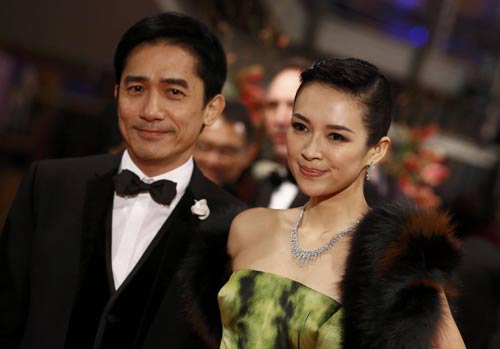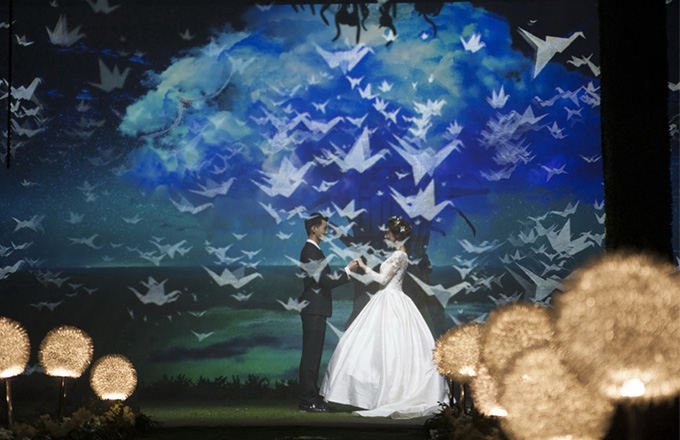Martial arts film genre popular in Berlinale
|
 Actors Tony Leung Chiu Wai (L) and Zhang Ziyi arrive for the screening of the movie Yi Dai Zong Shi, "The Grandmaster" at the 63rd Berlinale International Film Festival in Berlin February 7, 2013. [Agencies] |
BERLIN -- Chinese martial arts films have a long-standing reputation for pulling in big box office revenues.
Wong Kar Wai's new film, "The Grandmaster", premiered Thursday to international audiences and opened the 63rd annual Berlin Film Festival.
Outside the opening gala a sea of Chinese martial arts fans waited to get a glimpse of the director and his lead actors Tony Leung and Zhang Ziyi.
The film, which chronicles the life of Wing Chun master, IP Man, is an outstanding mix of Wong Kar Wai's poetic use of light, color and music combined with fantastic Kungfu fight sequences choreographed by the renowned Yuen Woo-ping.
Western audiences may love a good Kungfu flick. "Crouching Tiger Hidden Dragon", Ang Lee's large scale Kungfu film won four Oscars in 2001 and grossed over $200 million?worldwide.
The verdict has long been out that western audiences love Chinese fight films. But how much does the audience truly understand the complex philosophy of martial arts?
At the opening day press conference, Wong Kar Wai, who is also presiding over the Berlin Film Festival jury, spoke to Xinhua that there is "something in this film which is universal and I think it is about value about the family value, the code of honor. This is something that I think first of all I believe an audience and international audience can share, and about his endeavors to appeal to both Chinese and international audiences."
The first Chinese martial arts film, "Ding Jung Shan", was made in Shanghai in 1909. It introduced Wuxia, a traditional form of literature which used martial heroes in legendary tales, to the film genre.
Later Chinese martial arts films modernized in the 1960's and were popularized by Kungfu superstar Bruce Lee who studied under the "Grandmaster", IP Man.
Today at the European Film Market in Berlin, there is no shortage of Kungfu films to be seen or to be sold.
Jeffrey Chan, CEO of the Hong Kong film Distribution company, Distribution Workshop, has spent the last eight years selling Chinese films to European and western buyers.
"Action or martial arts films would sell better than drama also obviously better than comedy. Because drama and comedy mostly would be harder for the international audience or western audience to relate to the cultural or social context as the drama happened," Chan said.
Berlin Film Festival Director, Dieter Kosslick recounted to Xinhua, how the film made it's way to Berlin and what it is that really moved him to choose it as the opening film.
"I think we like Chinese martial arts films because the skills of these people to do their art is really great to look at," Kosslick said, "I think there was a peak at a certain time because it was so artistic that you started to have some doubts if they really can do it and if it's not special effects.
But the difference from Wong Kar Wai's film now, "The Grandmaster" you have the feeling that they are really doing it and they are doing it in which you have never seen this thing."
Tony Leung, who portrays the legendary IP Man in the film, studied Wing Chun for four long and hard years before making the epic.
Wong Kar wai, who began development on the film in 1997, visited over a 100 different schools of Kungfu in China during his research.
The film, which opened January 8th in China, has already grossed over $50 million.
Carlos Gonzalez, a film enthusiast and writer from Mexico, remembered that as a child, one of his favorite films as a child was "Enter the Dragon" of Bruce Lee.
"It was love at the first sight. It was just the way he moved and he talked with his hands. Different from having weapons in your hands, it is something we westerners don't have and I really like it and I appreciate it," Gonzalez said.
"I guess we want what we don't have. We envy the aesthetics that we see in Chinese films," he said.
Chinese martial arts films are to China what European knights and gun-slinging cowboys are to America. Universally, our heroes carry a certain code of ethics with them. They fight for good and in the end, restore our honor.
The Berlin Film Festival runs until February 17 bringing 404 films to the screens of Berlin. Only one lucky film will take home the Golden Bear on February 16.

























